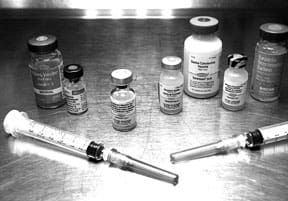Most dog owners are responsible and understand the importance of protecting their companions from preventable disease. That’s surely what motivated the dozens of people I observed standing in a long line with their dogs and puppies at a low-cost vaccination clinic offered in a local pet supply store.
In addition to vaccinations, the veterinary business running the clinic also offers flea and tick treatments, heartworm tests and preventive medication, and identification microchip implanting, so at the head of the line, a young man in a white coat and holding a clipboard asked each client what she wants for her pet. Dozens of times, I heard an owner say something like, “Well, we just got him, so I want to get whatever shots he needs.” It was a tense moment for me every time I heard this, since I was aware that the clinic had available for sale far more vaccines than the dogs and puppies standing in line were likely to “need.”
No universal protocol
Many dog owners are surprised to learn that there is no single, universally accepted canine vaccination schedule. Most trust their veterinarians to give their dogs whatever vaccinations the vet recommends – and many vets recommend more vaccinations than most dogs require in order to be protected from contagious disease.
This can probably only rarely be accurately attributed to opportunism on the part of the vet. Most vets use the vaccination schedules they receive with the vaccinations they buy from drug companies.
Historically, this was a sound choice. For decades after the first veterinary vaccines were developed, veterinarians and government regulators alike trusted the companies that studied, developed, and manufactured the lifesaving vaccines to recommend appropriate schedules for their use. Today, though, they are realizing their trust of the vaccine makers may have been slightly overextended for a decade or two.
You see, vaccine makers are in the business of selling vaccines. So it follows that most of them recommend that their vaccines be administered annually – despite the fact that independent studies have shown that many vaccines convey immunity from disease for many years, if not the lifetime of the dog.
In a policy statement about vaccines, the American Veterinary Medication Association (AVMA) acknowledges, “The one-year revaccination frequency recommendation found on many vaccine labels is based on historical precedent and United States Department of Agriculture regulation, not on scientific data. Even in those cases where scientific data was submitted to qualify the label claim, the data generated does not resolve the question about average or maximum duration of immunity.”
For a long time, the few experts who realized dogs may receive far more vaccines than they needed were not particularly worried. “It can’t hurt ’em!” But in the late 1980s, as medical science learned exponentially more about the immune system, proof began to turn up that repeated vaccinations could have deleterious effects on companion animals.
Today we know that adverse events may be associated with the disease antigen, the adjuvant (an agent added to increase or aid the effect of the antigen), carrier substance, preservative, or a combination of any of these. The AVMA vaccination policy statement says “Possible adverse events include failure to immunize, anaphylaxis, immunosuppression, autoimmune disorders, transient infections, and/or long-term infected carrier states.”
To their credit, when vaccines can be directly linked to specific, reproducible injuries or illnesses, the vaccine makers (and regulators) leap to study the problem, as in the case of vaccination site-associated feline sarcoma. Unfortunately, the problems experienced by dogs that many practitioners and researchers suspect may be linked to overvaccination are all over the map. Some suspect excessive vaccines are linked to the increased incidences of many diseases, including cancer, epilepsy, severe allergies, thyroiditis, autoimmune hemolytic anemia, Addison’s disease, and even behavioral problems such as aggression.
Get information
Fortunately, educated owners can do a number of things to make sure that their dogs are adequately protected against disease, without overvaccinating.
There are canine vaccines for more than two dozen diseases, with many vaccines available in combinations with others. Very few dogs are at risk for all or even most of the diseases. So the first step is to learn about the diseases the vaccines are designed to defend your dog against.
Before agreeing to any vaccination, ask your vet about the disease it prevents. What is its incidence? How is it transmitted? Is it more prevalent in some climates or parts of the country than others? Is the disease treatable, and if so, how many dogs recover? Then you can extrapolate the answers to your dog and locale.
If you learn that the disease kills many dogs who contract it, and the virus is everywhere, well, you probably authorize that vaccine, right? But if you lived in a city apartment with a Papillon who didn’t so much as visit parks, a vaccination for a tick-borne disease like Lyme is really not needed.
Today, most veterinarians discuss vaccines in terms of “core” versus “non-core” products. Core vaccines are those that can protect your dog from the diseases that are widely distributed in your part of the country, virulent, and highly infectious. Think of them as the vaccines with the highest benefit to risk ratio. Non-core vaccines are those that are intended for a minority of dogs in special circumstances. They may target diseases that are of limited risk in your area, or those that present only a low-level threat to your dog’s health.
“Core” vaccines
These are the vaccines for diseases that most experts agree puppies and dogs should be protected against – diseases that are highly contagious and potentially fatal.
Ronald D. Schultz, PhD, is department chairperson and a professor at the School of Veterinary Medicine, University of Wisconsin in Madison. He’s also one of the country’s leading experts on veterinary vaccines, having performed research for or with literally every veterinary vaccine company in the U.S. We’ll use Dr. Schultz’s list of “core” vaccines for dogs:
• Canine parvovirus type 2 (CPV-2)
• Canine distemper virus (CDV)
• Canine adenovirus type 2 (CAV-2)
• Rabies virus (RV)
For what people commonly refer to as “puppy shots,” many veterinarians use a combination vaccine that contains antigens for distemper, hepatitis, leptospirosis, parainfluenza, and parvo (referred to by its initials, DHLPP). If you are concerned about overvaccination, ask your veterinarian if she can vaccinate your puppy against just parvo, distemper, and adenovirus (the rabies vaccine is usually given separately later, after the puppy is 16 weeks old). A vet can purchase and use individual vaccines, but she may have to buy them in bulk, and won’t be happy about it if you are the only one in her practice who wants them.
Most experts agree that puppies should be vaccinated against distemper, parvo, and adenovirus, not before six weeks, and at least once after the age of 12 weeks; the rabies vaccine is given after 16 weeks. About two weeks after the last vaccination with distemper, parvo, and adenovirus, ask for a vaccine titer test to confirm your puppy has been successfully immunized (see “Titer Tests: A Terrific Tool” sidebar).
“Non-core” vaccines
Then there are the non-core vaccines. Some (including Dr. Schultz) refer to all the other vaccines that are available as non-core, suggesting that these be given only to dogs that need them, and only as often as needed. For these vaccines, the ratio of benefits to drawbacks is less weighted toward the benefits – at least for most dogs.
A good example is leptospirosis. The duration of the immunity typically conveyed by the lepto vaccine is generally less than one year, so to convey optimal protection from this disease, it must be given at least twice a year, every year. Also, the vaccine used must contain all four strains of the disease that are currently available to vaccine makers, because the strains do not provide cross-protection. Lepto poses a very minimal risk in many regions of the U.S. And where it is more common, there have been recent reports of new strains emerging, for which there are no vaccines yet.
All of this suggests that administering the vaccine would benefit only those dogs living in an area with a current, high rate of infection – and only if they are properly vaccinated at frequent intervals with all the available strains.
“Not recommended” vaccines
Some experts classify some vaccines in a third category of “not recommended.” These would include any vaccine for which they perceive to be no realistic benefit.
For example, there is now a vaccine against giardia, which is a protozoan intestinal organism that dogs may be exposed to when drinking out of ponds or streams. Many veterinarians feel that despite the marketing efforts behind the vaccine, giardiasis poses little risk to most dogs.
Many experts also doubt the usefulness of the coronavirus vaccine. According to Dr. Schultz, “To date, no one can demonstrate a benefit for coronavirus vaccine.”
Other vaccination tips
When they learn that overvaccination may be harmful to their dogs, many people ask, “Why would my veterinarian suggest doing something that could hurt my dog?” The fact is, information about the potential risks of overvaccination is fairly new. Veterinary colleges, the AVMA, and the American Animal Hospital Association (AAHA) have changed their suggested vaccination schedules in only the past few years.
A few final vaccination tips:
• Use vaccine titer tests to determine whether your dog is adequately immunized against the core diseases. (For more detailed information, see “Taking the Titer Test,” WDJ December 2002).
• Don’t rely on low-cost clinics for your dog’s vaccinations. These clinics exist to sell vaccines, not to provide full care or detailed advice. They cannot provide the full hands-on exam that your dog should receive at least once a year, and may not take the time to determine whether a vaccination is contraindicated for your dog. Instead, establish a relationship with a veterinarian who will take the time to examine your dog, ask about his health history, answer questions about the benefits and risks of various vaccines, and recommend an individualized vaccination protocol for your dog that takes your dog’s health, his lifestyle, and his environment into account.
• Do take your dog to your veterinarian at least once a year. A thorough annual (or better yet, semiannual) health examination and annual titer test is the best way to find problems early, before they are difficult and costly to treat. Your veterinarian can also help you develop a sound preventive health program to keep your dog vital to the very end of a long, happy life.
• Vaccinations are contraindicated for dogs who are not healthy. Do not vaccinate dogs who suffer from chronic or acute health problems, running a high temperature, or who have a history of vaccine reactions. This sounds simple, but many times people go to the vet for an injury, say, an abscess or to remove an embedded foxtail, and the vet notices the dog is “overdue” for vaccinations. The dog is currently battling a local infection! Do not have him vaccinated at that time.
• Don’t vaccinate elderly dogs. If your dog has been vaccinated many times in his younger years, he is probably as well immunized against disease as he will ever be. Plus, his exposure to disease decreases as he ages and travels and exercises less.
-Nancy Kerns is Editor of WDJ.







That is a good point that vaccines help protect against diseases. Maybe it would be good to get a vaccine for my dog. Then I would be able to keep my dog protect from diseases.
It’s good that you point out that having your dog vaccinated can help keep it from catching diseases. I want to make sure my new puppy has a long and healthy life, so I’m considering taking him to a veterinary hospital to have him vaccinated. I’m going to look for a good veterinarian in my area that provides pet vaccinations.
It’s helpful that you point out that having your dog vaccinated can protect them from diseases. I just got a new puppy, so I’m considering taking him to a veterinary clinic to have him vaccinated. I’m going to look for a good vet in my area that does dog vaccinations.
It’s helpful that you say that vaccinations can help protect your dog from diseases. I just adopted a dog, so I’m considering taking her to an animal hospital to get vaccinated. I’m going to look for a good animal hospital in my area that does dog vaccination.
It makes sense how you said that you want to be sure to have trained professionals because they are trained to give detailed advice and care. Getting your pets vaccinated would be really important though because you need to be sure that they are safe from disease. If you can find professionals who will help you do it then you’d really end up protecting your pet.
It’s valuable that you elaborate on how vaccinations can help keep your dog from getting diseases. I want my new puppy to stay healthy for a long time, so I’m thinking about taking him to a veterinarian to get vaccinated. I’m going to look for a good veterinarian in my area that does pet vaccinations.
It’s great that you elaborate on how vaccinations are an important part of keeping your dog safe from diseases. I want to make sure I’m doing everything necessary to protect my new dog’s health, so I’m considering taking him to a veterinary clinic to get vaccinated. I’m going to search in my area for a good veterinarian that does vaccinations for dogs.
It’s interesting that you mention that vaccinations can help keep your dog safe from diseases. I just adopted a puppy last week, so I’m thinking about taking him to a veterinary hospital to get vaccinated. I’m going to look for a reputable veterinary hospital in my area that offers dog vaccination services.